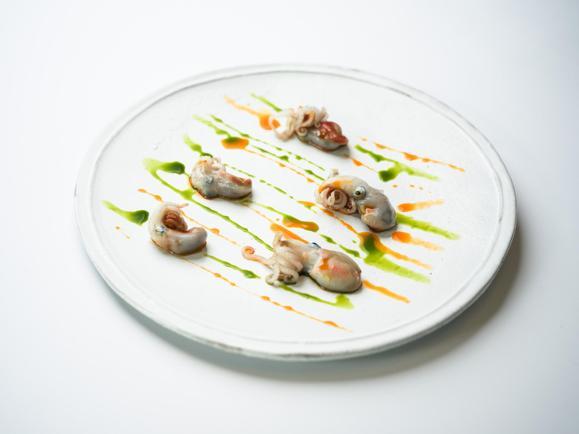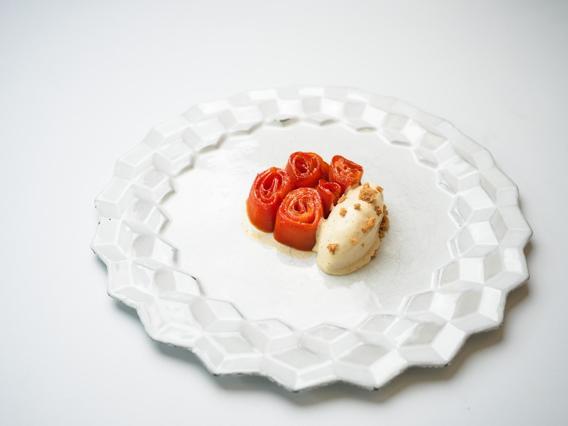
Some chefs make plates; others write their worldview on a plate. Bruno Verjus belongs to the latter. With his small yet profoundly influential restaurant Table in Paris, he challenges the notion of fine dining both from within and from outside the system, turning his kitchen not into a place of “performance” but into an arena of love, attentiveness, intuition and radical sincerity. That Table stands side by side in the world’s most respected rankings with restaurants powered by enormous teams and monumental budgets is, for many, an anomaly in itself. Because Table derives its magnitude not from size, but from intention. A tiny dining room, deceptively simple plates, an almost decoration-free stage… and behind it all, a towering truth: A chef whose aim is to cook his soul.
What makes Bruno Verjus’ story truly singular is not only his culinary philosophy. It is the fact that he entered the kitchen at the age of 54. Yes — at an age when most chefs are nearing the apex of their careers, he walked into the kitchen like a novice. And perhaps that is precisely why he broke the rules from the very first day. Verjus’ late arrival in the kitchen is not a disadvantage; it reveals one of the biggest blind spots in culinary culture: First understand life, then cook.
He spent years as a writer, photographer and radio host — he listened, observed and absorbed long before he ever lit a stove. This accumulation now flows onto his plate not as “information” but as wisdom. At the center of his cooking lies a phrase modern gastronomy often forgets.
“Food is merely something you swallow. You eat it, you digest it — it becomes a part of you.” This is, in many ways, the essence of his quiet revolution. Today’s fine dining landscape often counts a dish incomplete if it hasn’t passed through a camera lens. Technical fireworks, molecular tricks, multilayered garnishes, endless emulsions… kitchens increasingly resemble laboratories and food shifts from sensory expression to intellectual gymnastics. Verjus rejects that burden entirely. “I don’t want people to analyze everything as if they’re in a biological lab,” he says. Because analysis turns food into an object — stripped of emotion. And for him, food is a state of feeling.

That is why he insists: When a plate arrives, resist the urge to decode it. As he says, you wouldn’t kiss someone the moment you meet them. First you look, you approach, you breathe in, and then — only then — you taste. Verjus calls this “feeling more.” And it is precisely here that one of Table’s most iconic dishes becomes both metaphor and manifesto: The half-raw, half-cooked lobster.
This is not merely a technique; it is a philosophy. The lobster is barely cooked — just brushed by a whisper of heat. Yet in the mouth, it carries the refinement of a fully cooked texture. It is “cooked in the mouth,” a technique not built on temperature, but on perception itself. This is not culinary showmanship; it is the art of letting the ingredient reveal itself. How “cooked” the lobster feels is determined by your own internal frequency.
In essence, Bruno Verjus isn’t cooking the food — he’s cooking the moment with you. That is why the freshness in his dishes travels through your veins. It is not merely a taste; it is an experience of wellness — a lightness in the body, a clarity in the mind, a lingering but weightless brightness. When you leave Table, you don’t feel full; you feel nourished. This is why Table becomes, for many, not just a restaurant but a kind of sensory cleansing, a gentle reconnection with one’s own body.
Verjus’ relationship with producers is an act of courage in a world obsessed with control. He tells them: “Send me whatever you want, in whatever quantity you want — as long as it’s the best.” The menu does not dictate the product; the product flows in like life itself. Every morning, a small parcel lands at his door. Tomatoes? Fine. Greens? Wonderful. Sometimes there’s enough for six guests, sometimes less — it never matters. Because in his kitchen, there is no authoritarian menu to copy. There is only one rule: “I cook with what I have.”
This approach turns the kitchen from a production line into a living organism. Each dish is shaped by daylight, temperature, wind and mood. If the sun filtered through the leaves differently that morning, the evening’s plate carries its trace. Verjus’ reason for opening a restaurant is perhaps one of the most disarmingly honest confessions in gastronomy: “I was tired of restaurants. I didn’t want to go anymore. I was disappointed.” He dreamed of a place that carried his own breath — modest, approachable, a neighborhood table. But built on extraordinary ingredients, clean plates and an honest soul.
Today, even as he stands among the world’s finest dining rooms, his mindset remains unchanged. He continues to advocate for the most difficult kind of simplicity: “With great ingredients, you eat great food — and you’re happy.” Very few restaurants in the world achieve this paradox: Immensely ambitious, yet deeply humble.
Table’s global success is not always echoed at home. “In France, they hate me,” he says. Journalists publish pieces claiming, “He can’t cook, yet he’s on the list.” None of it fazes him, because he sees the core problem clearly: “Our mindset is narrow. We close our eyes to what’s happening in the world.”
Perhaps he is too free, too boundaryless, too intuitive for France. But the world understands him, which is why Table has held a place in the Top 10 of The World’s 50 Best Restaurants, proudly remaining the smallest restaurant ever to enter the list.

One of his most powerful statements about cooking is this: “To feed people is to care for them — to love them.”
His restaurant, his plates, his tone, his reverence for producers — all orbit around this idea. The instinctive affection with which a mother makes soup for her child, or a lover prepares a meal for their partner, Verjus channels this into a professional form. In today’s competitive food world, saying something so unguarded is surprisingly radical. Because for him, cooking is not an ego trip; it is an offering.
You may find the finest ingredients — but what will you put into the dish? Verjus answers: “Not ego. Generosity. Love.”
And perhaps that is why people leave Table with the same sentiment: “Yes, I ate well — but more importantly, I felt well.”
Bruno Verjus’ revolution is precisely this: A cuisine built not on technique, but on spirit. Not on spectacle, but on naked honesty. Not on fullness, but on freshness that runs through the bloodstream.
A cuisine that does not overwhelm — but transforms.